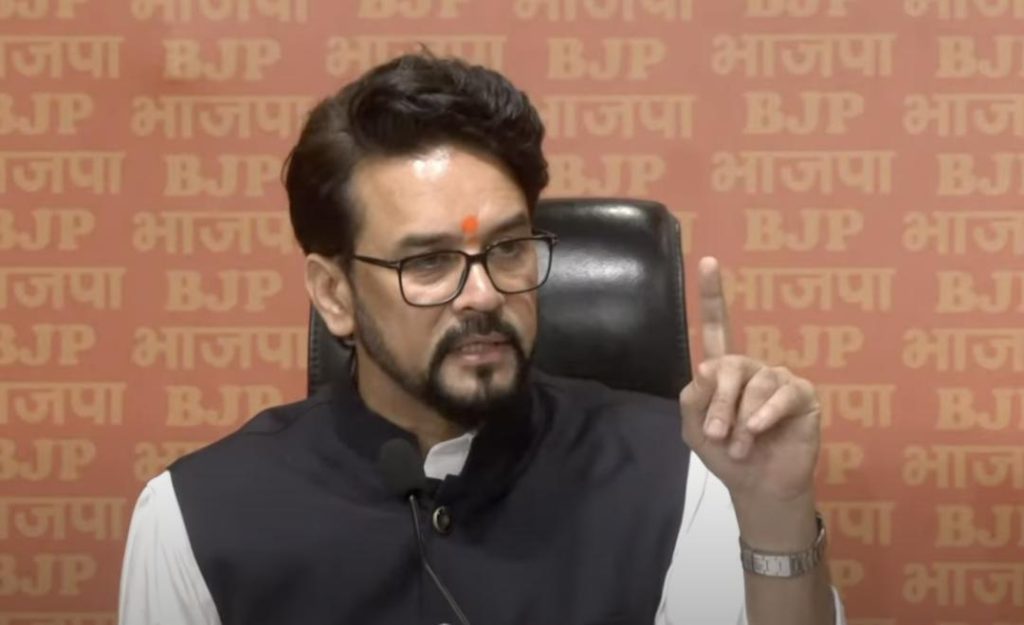
Congress & CPI made Bhimrao Ambedkar lose the poll in 1952: BJP
The first general election of independent India was held in 1952, and it was a significant milestone in the country’s political history. The election was contested by various political parties, including the Indian National Congress, the Communist Party of India (CPI), and the Indian Socialist Party. However, the election was marred by allegations of electoral corruption and malpractices, which ultimately led to the defeat of Dr. B.R. Ambedkar, the architect of the Indian Constitution.
In a recent statement, BJP MP Anurag Thakur accused the Congress and CPI of laying the foundation of electoral corruption in the very first election of 1952. According to Thakur, the two parties together conspired to defeat Dr. Ambedkar, a constitution maker and a Dalit leader, in the election. Thakur’s statement has sparked a heated debate on the role of political parties in the country’s electoral process.
Dr. Ambedkar was a prominent figure in Indian politics, and his contribution to the country’s independence and development cannot be overstated. As the Chairman of the Drafting Committee of the Constitution, Ambedkar played a crucial role in shaping the country’s governance structure. He was also a fierce advocate for the rights of Dalits and other marginalized communities.
Despite his immense contribution to the country, Dr. Ambedkar’s electoral career was marked by controversy and defeat. In the 1952 general election, he contested the elections from the Bombay South constituency against K.T. Shah, a Congress candidate. The election was closely contested, with Ambedkar losing by a narrow margin of 1,242 votes.
However, in a shocking revelation, Thakur claimed that the Congress and CPI conspired to defeat Ambedkar in the election. According to him, the two parties together secured 74,333 votes that were rejected in the election. This, Thakur argued, was a clear indication of electoral malpractices and corruption.
Thakur’s statement has sparked a heated debate on the role of political parties in the country’s electoral process. Many have questioned the veracity of Thakur’s claims, arguing that there is no evidence to support his allegations. Others have defended Thakur’s statement, pointing out that electoral malpractices and corruption have been a persistent feature of Indian politics for decades.
The Congress party has rejected Thakur’s statement, calling it an attempt to divert attention from the BJP’s own electoral malpractices. The CPI, on the other hand, has refused to comment on the issue, citing a lack of evidence to support Thakur’s claims.
Despite the controversy surrounding Thakur’s statement, there is no denying that electoral malpractices and corruption have been a persistent feature of Indian politics. The country has a long history of electoral irregularities, from booth capturing to tampering with EVMs. The Election Commission of India has taken several measures to curb electoral malpractices, including the use of VVPATs and the deployment of central forces in sensitive constituencies.
However, despite these measures, electoral malpractices continue to plague the country’s electoral process. In recent years, several high-profile cases of electoral malpractices have come to light, including the 2019 general election and the 2020 Delhi assembly election.
In conclusion, while Thakur’s statement has sparked a heated debate on the role of political parties in the country’s electoral process, it is clear that electoral malpractices and corruption have been a persistent feature of Indian politics for decades. The country needs to take concrete measures to curb electoral malpractices and ensure free and fair elections.
Source:
https://youtu.be/0kLyW5rSJSg






